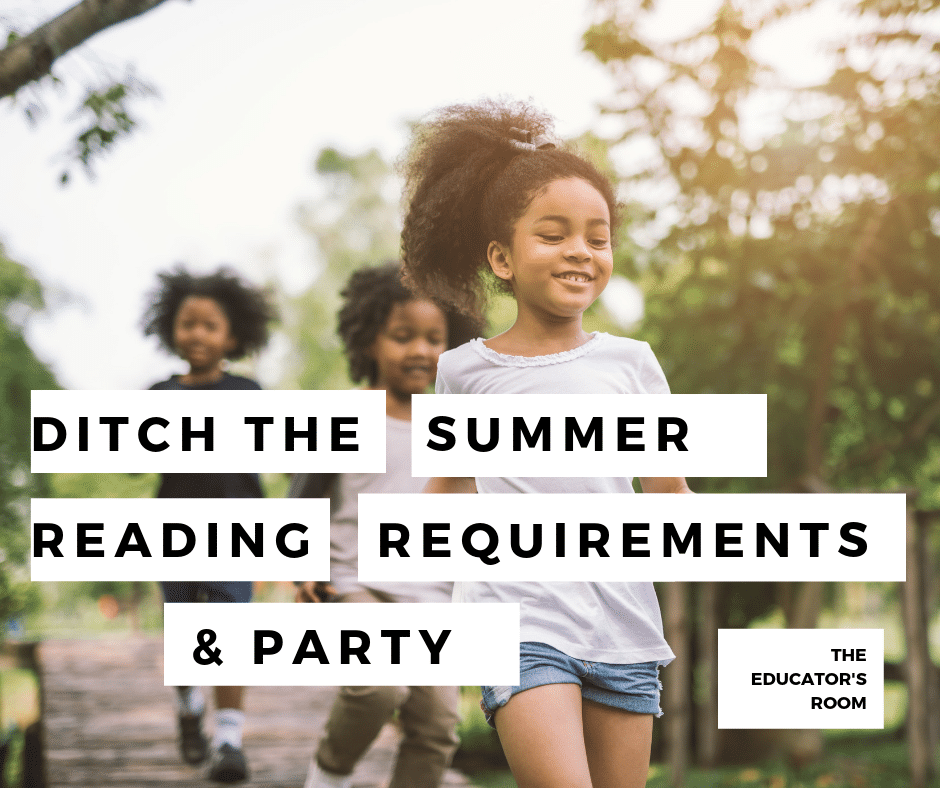Everywhere I turn I see another summer reading requirement: logs, papers, projects, lists, grade-level requirements, and on and on from Pre-K through 12th grade. I get requests from people for things like, “my son’s AR level is a 5, do you have suggestions for summer reading?” or “We are revamping our summer required reading list, who has suggestions?”
The intentions behind these are all good: keep kids reading during the break to avoid the dreaded Summer Slide that happens otherwise. Educators and parents with kids who are already struggling or reluctant readers worry that if they don’t mandate reading, their kids won’t do it and thus fall further behind the rest of their peers.
The problem is this: kids who don’t want to read, still don’t want to read when you tell them to read a book and do an assignment. In fact, being required to read The Great Gatsby and write a paper or even choose a book and keep a reading log to show that they are reading will fast-track these kids to hating reading even more. And it could negatively impact kids who do love to read.
[bctt tweet=”Kids who don’t want to read, still don’t want to read when you tell them to read a book and do an assignment.” username=””]
When teachers mandate what students read over the summer, they are furthering the idea that reading belongs to school and not to enjoyment (Miller). If we want our children to be better readers, then they have to read a lot. If we want them to read a lot, reading has to be something that appeals to them.
I have been a reader my whole life, but I can tell you when that love dwindled: in middle school when, for the first time, I was required to read a book that I didn’t pick and take tests on it. I had to read Johnny Tremain which was published in 1943–that was fifty years old even when I was in school–and The Whipping Boy about an orphan who takes punishments for a prince. Both were written by old white people who liked to write books about white boys. Nobody asked me what kinds of books I liked or if I enjoyed historical fiction or adventure novels. They just told me to read it. I did because I was a reader. But what about those kids who struggled to read? Those who were still trying to decode many words and now they were handed a book they couldn’t care less about?
As a lifelong reader, I have already completed nine books this summer. I don’t keep track of how long I read when I read. I don’t write summaries or make a poster when I am finished. I read what I want when I want. I have access to purchasing books and through my local library. I have a car to drive me these locations. I am able to find quiet time in my days to steal moments with a book.
Like other homework, requiring a certain list of books or a certain amount of time each day of reading is more about grading compliance and accessibility than it is about creating better readers.
It is true that children who read during the summer do better than those who do not. So what can be done to encourage reading?
Give them a choice:
Kids need to pick what they read if they are going to be invested in it. My own children are total opposites: one is a voracious reader, the other avoids reading completely. Their school gives no summer homework but does encourage reading. Kids can read whatever they want, and reading TO children counts (which we have found works GREAT for our avoider).
Give them access:
My kids and I go through books like water in the summer. But we have access: the library, book stores, audiobooks, etc. because we have a car to bring us to where the books are, and money to fill the gas tank. We also have the time to get books and read them. Our students need access too. Allow summer checkout at the end of the school year. Help kids find the nearest library branch to where they live. Show them how to use Sync, an audio site that offers completely free downloads for kids ages 13+ each summer.
Give them a break:
I agree with The Global Read Aloud founder Pernille Ripp that it’s really not fair to tell kids what to do with their time off. They are not in school during the summer, so they should have to “do school” if they don’t want to. We can encourage reading, but we should also encourage playing board/card games, discovering the outdoors, and using imagination. Some kids will travel; others will not. We don’t know the circumstances of our students’ summer, so we shouldn’t assume they will have time or be able to do an assignment for us.
In the end, we want our kids to choose reading to fill the time in between other things. We need to build that culture and provide access all school year if we want kids to voluntarily do it on their own time.

References:
Miller, D. (2019, June 17). If Kids Can’t Read What They Want in the Summer, When Can
They?: Opinion. Retrieved July 15, 2019, from https://www.slj.com/?detailStory=if-kids-cant-read-what-they-
want-in-the-Summer-when-can-they
Pernille Ripp. (2017, April 13). On Assigned Summer Reading. Retrieved July 15, 2019, from
https://pernillesripp.com/2017/04/13/on-assigned-summer-reading/





As a teacher and parent, I agree with this 100%! When I taught MS, I was forced to give the dreaded (pre-planned) summer reading assignment (now as an elementary Intervention teacher, I’m off the hook). And, as the kids get older, they are required to complete not just summer reading, but math, history, science…all over their summer vacation. It sucks the joy right out of sitting down with another book for a fun summer escape. Great thoughts and post!